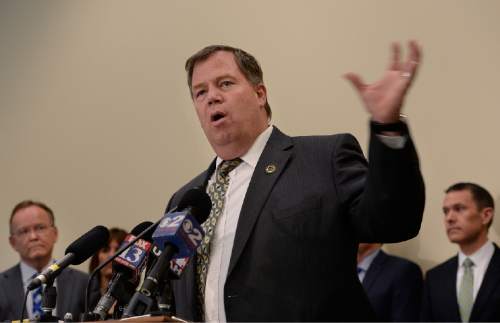This is an archived article that was published on sltrib.com in 2015, and information in the article may be outdated. It is provided only for personal research purposes and may not be reprinted.
A packed hearing room erupted in applause Friday when the House Law Enforcement Committee unanimously endorsed a major overhaul of the state's criminal justice laws. HB348 seeks to greatly enhance drug and mental-health treatment and reduce the time addicts stay in prison by dropping some crimes from a felony to a misdemeanor.
But concerns remain, even among some supporters. This massive change requires a major increase in funding for treatment providers. Rep. Eric Hutchings, R-Kearns, the sponsor of the reform package, was planning on an expansion of Medicaid to help provide that treatment money.
House Republicans have so far refused to take up that legislation, known as Healthy Utah, creating a stalemate with the Senate and Gov. Gary Herbert.
Hutchings said his bill should proceed no matter what happens with Medicaid expansion and the $8 million it would provide counties for treatment and supervision of offenders would be a down payment on future funding increases.
His bill would create an early assessment for people convicted of a crime. Those whose offenses were driven by a drug addiction or a mental-health problem would be diverted into a treatment heavy program, with a lighter prison sentence. That treatment would continue when those offenders are released. And an enhanced supervision system would allow probation and parole officers to immediately punish or reward offenders based on their actions.
Hutchings estimated that it would take $21 million to provide enough treatment slots.
County prosecutors have their own worries. They fear reducing drug-possession charges from a felony to a misdemeanor would shift many offenders from the state system to the county jails, which could become a financial burden.
Hutchings, along with Ron Gordon, the director of the Utah Commission on Criminal and Juvenile Justice, said they hope their plan would move people with addiction problems out of the jail faster since they would have shorter sentences. And enhanced treatment should reduce the number of people who return to jail or prison for violating probation or parole.
Hutchings noted that two-thirds of the people admitted to the state prison in 2013 had violated their probation and parole and that over the last 10 years, drug sentences have grown longer by from two to four months.
"We have more people going to prison, and more people spending more time in prison, even though we have fewer crimes being committed," Hutchings said. "It is not logical. It doesn't make sense."
Committee members said they were worried about properly funding Hutchings' bill, but were supportive of his plan, which is an extension of a nationwide "justice-reinvestment" effort. More than two dozen states have passed similar reforms meant to slow the growth in the prison population.
Utah has about 7,000 people incarcerated.
Rep. Kay McIff, R-Richfield, who is a former district court judge in Utah, argued that HB348 is an appropriate step away from tough-on-crime policies of the past.
"I think we have been on a 30-year binge of the felonization of America," he said.
The committee accepted a new version of Hutchings' bill that kept drug dealing as a second-degree felony (his original bill sought to reduce the charge to a third-degree felony). The new version also would allow prosecutors to charge an offender with a felony on their third drug possession case and it drops a slate of traffic violations from class C misdemeanors to a simple infraction. That would included such offenses as failure to register a vehicle, have insurance or visible license plates.
HB348 now goes to the full House.



